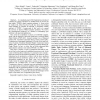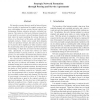65 search results - page 11 / 13 » The Complexity of Nash Equilibria in Infinite Multiplayer Ga... |
CORR
2010
Springer
13 years 5 months ago
2010
Springer
We propose a new class of game-theoretic models for network formation in which strategies are not directly related to edge choices, but instead correspond more generally to the ex...
SIGECOM
2006
ACM
13 years 11 months ago
2006
ACM
In traditional game theory, players are typically endowed with exogenously given knowledge of the structure of the game—either full omniscient knowledge or partial but fixed in...
ECAI
2006
Springer
13 years 9 months ago
2006
Springer
Abstract. Game theory is a widely used formal model for studying strategical interactions between agents. Boolean games [8] are two players, zero-sum static games where players...
FOCS
2009
IEEE
14 years 16 days ago
2009
IEEE
— In a landmark paper [32], Papadimitriou introduced a number of syntactic subclasses of TFNP based on proof styles that (unlike TFNP) admit complete problems. A recent series of...
FOCS
2006
IEEE
13 years 12 months ago
2006
IEEE
We introduce a game theoretic model of network formation in an effort to understand the complex system of business relationships between various Internet entities (e.g., Autonomou...




